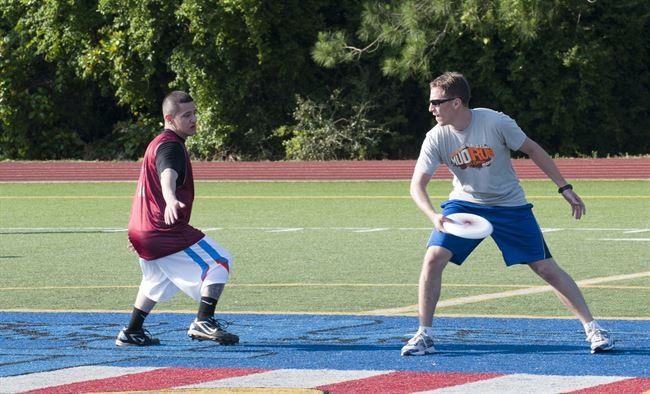
MONTPELIER, Vt. — Vermont is now the first state in the United States to recognize “ultimate” — the game that started as Ultimate Frisbee — as a high school varsity sport.
A committee that oversees high school sports in the state, the Vermont Principals Association, unanimously approved ultimate last week as a varsity sport starting in the spring of 2019.
Ultimate is played on a field slightly smaller than a football field by teams of seven. Players pass a disc down the field until a teammate catches it in the end zone. If the disc is dropped, it is turned over to the other team. The game is widely known as Frisbee but the trademarked toy name is not officially used for the sport.
Bob Johnson, associate executive director for the association, said the sport was sanctioned as an exhibition sport for the last three years and has grown tremendously in Vermont high schools. It attracts students who aren’t drawn to traditional high school sports like soccer, baseball or basketball, he said.
“If you can get students involved in sports or activities they do better academically,” Johnson said. “The more opportunities we can create, the better things are.”
Johnson said they expect 13 or 14 schools teams for boys in 2019 and seven to 10 for girls. There will also be a state championship tournament.
Montpelier High School physics teacher and ultimate coach Anne Watson said she began the push for varsity recognition seven years. Varsity ensures the players won’t have to pay to participate and that coaches are paid and given safety training.
“It’s a matter of equity,” Watson said Monday noting, her school, with 352 high school students, has treated the ultimate teams as though they were varsity for some time.
Her players are thrilled with the recognition. Even though the girls and boys teams have won state championships at the club level, they’re looking forward to being able to see their championship banners displayed in the school.
“It’s competitive in a good way,” said Montpelier junior Sophia Currier, who said she feels ultimate isn’t as nasty as some other sports.
Charlie Eisenhood, the editor-in-chief of the website Ultiworld, which considers itself to be a news media website dedicated to the sport, said the sport has come a long ways in the last decade from when it was thought of as a game for hippies that was played with dogs.
“I do think it is a milestone achievement,” he said of the Vermont decision.
Andy Lee, spokesman for the sport’s governing body, USA Ultimate, said Monday Vermont’s recognition of ultimate as a varsity sport sends the message that it’s a real sport. The group sanctions teams at the youth, college and adult levels, and passed 50,000 members in 2015.
“It’s another step toward visibility and legitimacy,” he said of the sport founded at Columbia High School in Maplewood, New Jersey, in 1968.
While ultimate has been growing, a national participation survey by the Indianapolis-based National Federation of State High School Associations, found 33 boys programs and 29 girls programs across the country, said Assistant director of Communications Chris Boone.
“I wouldn’t call it an emerging sport quite yet, but when a state association sanctions a sport like that you tend to see it pop up in other places as well,” Boone said.
Dan Shepardson, the activities director at Vermont’s Champlain Valley Union High School, just south of Burlington, said the school has about 30 boys playing ultimate and seven or eight girls. He expects the school will field both a varsity and junior varsity team when the sport turns varsity.
Unlike most team sports, ultimate has no referees, requiring the players to work out their differences.
“That’s a pretty important life skill, I think, being able to resolve a disagreement peacefully and quickly so they can move on,” Shepardson said.










